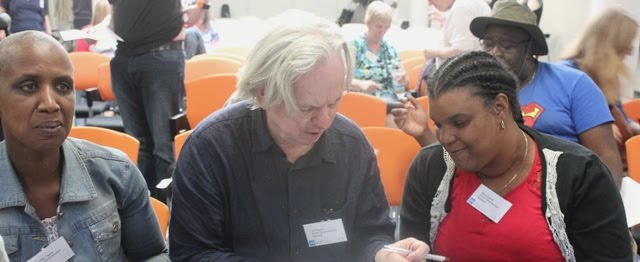This blog originally appeared on the Department of Health website
One of the great things about writing easy-read documents is that you really have to stop and think about each and every word and exactly what means. For any words that may be difficult to understand or not used very often, and for outright jargon, you have to stop and think and then put them into easy-to-read words.
Equality is one of those words. It’s also one of the four key principles for co-production in SCIE'
guide, Co-production in social care: what it is and how to do it. And when it came to writing the easy read version of the guide summary, it was an interesting word to think about. (If you want to access one, please email us).
guide, Co-production in social care: what it is and how to do it. And when it came to writing the easy read version of the guide summary, it was an interesting word to think about. (If you want to access one, please email us).
Equality’s not a particularly long word
...and the meaning is fairly clear at face value. Everyone is equal and that everyone should be treated the same.
But it’s not that simple. Everyone isn't the same. Treating everyone as the same would mean not doing all the important things that you need to do in co-production (and in other things) to make sure you have diversity in your work.
The key thing is not that everyone is the same
...It is that nobody is more important than anyone else. Andrew Cozens - an independent social care and health policy and improvement specialist - makes the point in the Have we got co-production news for you? film that supports the guide saying equality means. He says: “Your perspective is equally valued whoever you are in the process; nobody is more important than anybody else.”
The principle of equality is a key foundation for co-production. It is what makes co-production different from previous approaches to working with people who use services and carers, such as participation and involvement.
The principle of equality also means everyone has assets
Knowledge, experience and skills are brought to the co-production effort. Making the most of these assets and working with everyone as equals, is the key to success in co-production.
Achieving this means doing things like developing structures to communicate with everyone who should be part of the co-production process, making sure that everything is accessible and making sure that everyone gets something positive from taking part in co-production. Crucially, equality can only be achieved with a shift in power to people who use services and carers; people are only equal if they have the same amount of power.
SCIE's guide takes readers through the changes that organisations and projects need to make, through a jigsaw model of change management covering culture, structure, practice and review. So that they don't just know what the words mean on the page, but what they mean in action.


No comments:
Post a Comment